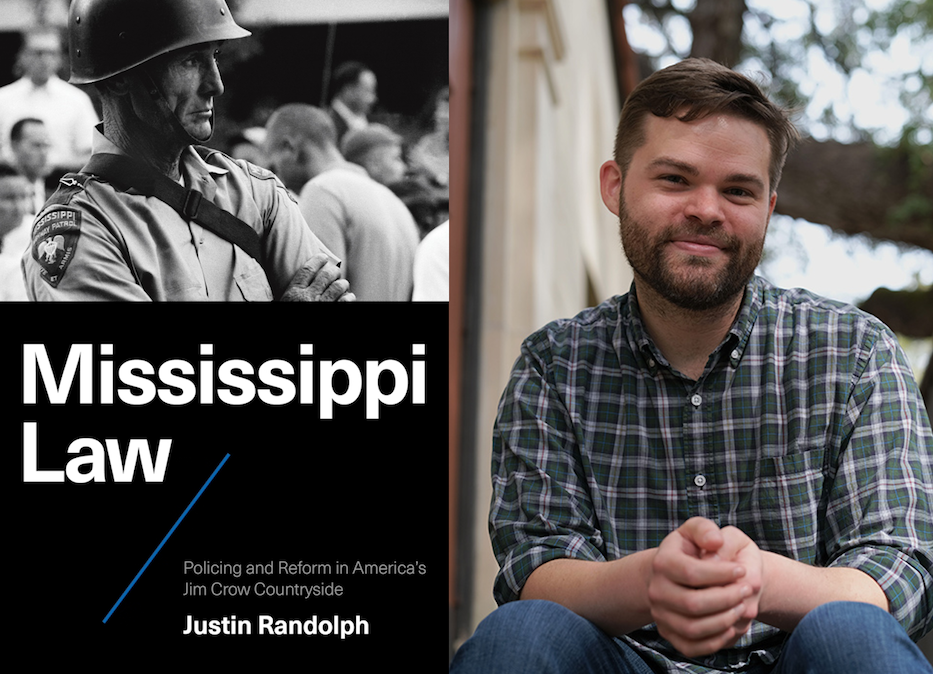In Conversation with Dr. Justin Randolph (History, Texas A&M), author of "Mississippi Law: Policing and Reform in America's Jim Crow Countryside" (University of North Carolina Press, 2025)
February 4, 2026
12:00pm - 1:00pm
Recording Link: https://www.youtube.com/watch?v=Zar7wc6DH3s&t=1489s

His recent book, Mississippi Law: Policing and Reform in America's Jim Crow Countryside (University of North Carolina Press, 2025), examines how American police power shaped fights for Black freedom.
"In the segregated American South, policing was war. Rampant police violence came to the back roads and cattle pastures of America’s rural countryside as ideas of race, property, and belonging reshaped the role of government in everyday life. In Mississippi Law, Justin Randolph explores rural law enforcement to explain US racial authoritarianism between the Civil War and the civil rights movement. In Jim Crow Mississippi, the force behind the police officer’s autocracy carried legacies of empire and slavery into the age of agribusiness and automobiles—from state troops and slave patrols to state troopers and highway patrols. But this is no isolated story of individual barbarism. US military and reform traditions informed ruling-class beliefs in thoughtful police improvement through both the state militia and its inheritor, the state police.
"Black Mississippians fought to raise awareness and defend their loved ones against the violence spawned by paramilitary police reform. Some took up arms against police officers; others imagined a legal off-ramp to remake public safety after Jim Crow. Ultimately, the transformation of what one activist called “Mississippi Law” came with more funding and more authority for policing, a key piece of infrastructure for the age of mass incarceration that followed the civil rights revolution. Recounting the works of both famous and forgotten activists, Mississippi Law is a genealogy of Jim Crow rule and dreams of a safety that might have been and might yet be."
"Black Mississippians fought to raise awareness and defend their loved ones against the violence spawned by paramilitary police reform. Some took up arms against police officers; others imagined a legal off-ramp to remake public safety after Jim Crow. Ultimately, the transformation of what one activist called “Mississippi Law” came with more funding and more authority for policing, a key piece of infrastructure for the age of mass incarceration that followed the civil rights revolution. Recounting the works of both famous and forgotten activists, Mississippi Law is a genealogy of Jim Crow rule and dreams of a safety that might have been and might yet be."
“This powerful history of policing in the rural South reveals the origins of law enforcement as white control of Black mobility and freedom. Amid today’s calls for police reform and abolition, this book reminds us why history matters.”—Françoise N. Hamlin, author of Crossroads at Clarksdale: The Black Freedom Struggle in the Mississippi Delta After World War II
Dr. Justin Randolph's other research projects include histories of police desegregation, rural debt peonage, the Taser, and 9-1-1. His writing has appeared in scholarly outlets like the Journal of Southern History and Southern Cultures. He has also written for popular outlets such as The Washington Post, The Mississippi Encyclopedia, and the Mississippi Center for Investigative Reporting. He has received an American Council of Learned Societies (ACLS) Fellowship and prizes from both the Southern Historical Association and Agricultural History Society.
Series organizers (alphabetical) are Amber Broaden (CSUSB and CSU Dominguez Hills, Psychology), Stan Futch (President, Westside Action Group), Michael German (Brennan Center for Justice), Robie Madrigal (Pfau Library), Dr. Jeremy Murray (CSUSB History), Matt Patino (Crafton Hills College Adjunct Faculty), Dr. Mary Texeira (CSUSB Sociology). Click here to view previous panels in the Conversations on Race and Policing series (link). Thanks to Project Rebound and the CSUSB Pfau Library for their support of this event! Thanks to Thinh Ly, Parker Brooks, and the Information Technology Services team!
Thanks to Pfau Library, Project Rebound, and the Information Technology Services team for making this event possible!
